Xingfang’s Story

When I had my first child, my parents were able to come and support me. I felt very active and enjoyed my life with a baby very much. After my second child was born, my parents couldn’t come to New Zealand as the Covid-19 pandemic had already started. I started to feel anxious and stressed just after the baby was born. I heard about postnatal depression. I knew that I was feeling quite down after the birth, but I wasn’t sure whether it was depression. I was feeling mentally low, especially when I was alone with my baby in the evenings. I thought I might be recovered when I felt cheerful with other mums. I felt up and down all the time until my Plunket nurse noticed my anxiety and restlessness. She suggested I go and see my GP.
Fortunately, there are more talks about postnatal depression in China, but it was not easy for me to find any information about the treatment for recovery online. I contacted the Mother Helpers, and they sent me a booklet about postnatal depression. I found lots of useful information, including keeping exercising regularly, doing some counseling and keeping a good nutritious diet, in that booklet. This information gave me confidence that I would feel better and recover if I followed their recommendations.
I also joined a postnatal support workshop where I learnt that it’s important to take short breaks, little rests and set small and realistic goals. I find it very helpful to take little breaks to remain calm.
I’m learning to adjust my goals, perspective and adapt to a slower pace of life. It was a huge adjustment for me, as my culture has been advocating diligence and courage. Now I know, I wouldn’t work as hard as before to pursue career success, but would work harder to keep a more balanced lifestyle and do more things to keep me active and cheerful.
当大宝出生的时候,我爸爸妈妈从千里之外来到我们的小家帮忙。我一直充满能量,看到小婴儿欢欣鼓舞,带着宝宝和父母常常出游。我很少感到疲惫,特别享受有了孩子的时光。当我二宝出生的时候,正好赶上了新冠爆发国门关闭。家人无法来帮忙,孩子一出生,同时带大宝和二宝的我,常常陷入焦虑、难过的情绪,尤其夜晚和二宝单独待在卧室的时候,就很想哭。我听说过产后抑郁,我也清楚二宝出生后我有些抑郁。但白天和朋友妈妈在一起,我能偶尔欢笑,觉得自己好像好起来了。因此不确定我是不是产后抑郁了。这种抑郁情绪反反复复,直到Plunket的护士注意到我的焦虑和反常,她建议我去看GP。
幸运的是中国国内也有越来越多关于产后抑郁的讨论。但网上对于产后抑郁的治疗和恢复方法少之又少。我经GP建议,联系到了Mother helper的咨询机构。咨询师发给我关于产后抑郁的详细介绍,只要坚持锻炼,经常心理咨询,保持健康的饮食,抑郁症就会恢复。这给了我康复的信心和动力。但得知抑郁症后大脑神经永久变化,以后抑郁的概率会大幅增加,这一点令我久久不能释怀。
我还加入了一个产后抑郁小组,在那里我学习到该怎么恰当的放松、休息,以及怎样计划很小并切合实际的目标,比如在太阳下喝杯茶、每周跑步10分钟等等。及时休息能够让我在陪伴孩子时更容易保持冷静。
治疗抑郁对我来说,是个重大的转变过程。我的文化倡导勤勉和奋进,我也从之前雄心勃勃、高强度的生活中慢下来,降低对事业的期望,给予身体和心灵更多恢复。抑郁不分体质和性格,最根本还是因为过于劳累而身心透支。现在,我觉得也许我不能像从前那么拼命工作了,但会学习更加努力地生活,多做自己喜欢并能让自己恢复能量的事,这也许意味着我会拥有更平衡更幸福的生活。
Xingfang (Rachel) Cai
“Be kind to ourselves. Notice the signs of overwhelm and set “stop” and take breaks. By caring for ourselves we teach our children to care for themselves too.”
Xingfang (Rachel) Caiemy
Blue Stories Project
Mental Health Awareness Week is upon us and visual artist, Karolina Gorton, is brightening up the streets of Aotearoa with her vibrant pop-art-with-a-purpose. That purpose is to shine a light on perinatal depression, an illness that all too often goes undiagnosed and often carries with it a stigma that is unhelpful and unjustified.
This nationwide poster campaign (26 September – 8 October) is part of the wider Blue Stories Project. The stories from the posters, and more from around Aotearoa, can be experienced online at bluestoriesproject.com or in person at a number of exhibitions that are popping up around the country. Currently there is an opportunity to connect with 12 stories and portraits created in collaboration with Well Women Franklin at Pukekohe Library, in Auckland (until September 30). A second exhibition opens in Canterbury at South Library in collaboration with Perinatal Wellbeing Canterbury at 1pm on September 24. All are invited to attend to hear guest speakers, enjoy some refreshments and to connect with the exhibition.



